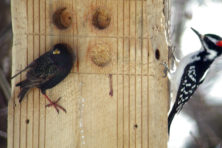The Starling for Citizenship
- Share
- Tweet
- Pin
- Share
Starlings are unloved, with notable exceptions being Shakespeare and Mozart. Few poets find the starling an attractive bird, most do not. The starling is broadly reviled as an urban pest bird, the haunt of every feedmill, lumber yard, shopping mall, church belfry, every industrial egregiousness, every road bridge. Starlings even fly weird. They look clownish. The consensus is the starling has no taste for good neighborhoods, no ambition to be upwardly mobile. Starlings are messy and not welcome in the high-rent district. These same characteristics of the starling endears this bird to me. A kind as can make the best of any accommodation inclusive of the local landfill strikes me as heroic. To wish all economists were likewise.
Mozart’s Starling is the title of a book by Lyanda Lynn Haupt, an Iowa-born naturalist, now of Seattle, she calls herself an Eco philosopher. Ms. Haupt is the author of a lovely little series of bird books: Crow Planet, Urban Bestiary, Rare Encounters with Ordinary Birds, Pilgrim on the Great Bird Continent, and in 2017, Mozart’s Starling.
The story goes how old Wolfgang purchased a starling on May 27, 1784, paying 34 kreutzer, the German word is Kreuzer, then a coin of the southern German states, initially of silver, later copper and worth about 1/120 of a Conventionsthaler, if by the time of its adoption in the southern German states its value had diminished to 1/144 of a Conventionsthaler. And in the case you’re wondering, 60 Kreuzer are worth one Gulden, in turn a 1¾ Gulden is worth a Thaler. Only to wonder what all this does for a nation’s math excellence, and that money absent weird fractions isn’t good for brain function.
Back to the story … Wolfie purchased the bird because he heard the starling sing a series of notes that Mozart duly wrote down in his account book, these same notes later became the opening lines of his Piano Concerto No. 17 in G. Mozart’s version corrected the starling’s choice of G to G sharp.
Those who don’t know starlings might find this tale absurd but as a country hymnist I have on a spring evening heard this same starling on its pulpit branch imitate both Mozart as well as the Grateful Dead.
The starling lived with Mozart for three years according to Ms. Haupt, dying on June 4, 1787. The bird was buried in Mozart’s rented garden with pomp and procession as veiled mourners followed singing a requiem. A gravestone was provided. A poem by Mozart of the occasion survives. Its opening lines:
Here rests a bird called Starling
A foolish little Darling
He was still in his prime
When he ran out of time
The piece goes on in likewise fashion to end:
For when he took his sudden leave
Which brought to me such grief
He was not thinking of the man
Who writes and rhymes as no one can.
In 1791 as Mozart was dying, a pet canary was in the same room. It was said the bird was removed from the room to an outlying room. And then again to another room, yet farther away. Seems Mozart at his dying could not bear the sound of it singing. Apparently too cheerful a requiem.
Perhaps also a diagnosis of Composer’s jealousy, another psalmist surviving to sing while he dies.
As for the bird, I am among those who believe an Act of Congress or Presidential Declaration of Clemency be allowed to creatures and weeds, flowers including the thistle, and to some birds, to grant them native status. Not that every weevil, beetle, green ash borer and gypsy moth be given citizenship but to those who have become good enough Americans never mind their weedy tendencies, be deemed now to belong. Including the starling, weedy it may be. To admit I have certain like relatives.
I should, relying on Mozart’s reputation, pose that the starling is one of the great composer-birds of this planet, on this alone granted as naturalized citizen of these United States. If to include a name change as Sturnus vulgaris is unfavorably inclined.
As for Shakespeare’s take on the starling: Henry IV Act one, Scene three, Hotspur in rebellion is trying to think of ways to torment the King and fantasizes about teaching a starling to sing the name of “Mortimer,” one of Henry’s avowed enemies.
“And in his ear I’ll hollo ‘Mortimer,’
Nay,
I’ll have a starling shall be taught to speak
Nothing but ‘Mortimer’ and give it him
To keep his anger still in motion.”
Shakespeare and Mozart I think are recommendations enough, to forgive and naturalize as citizen, Sturnus, this bird, not as vulgaris as you think.

